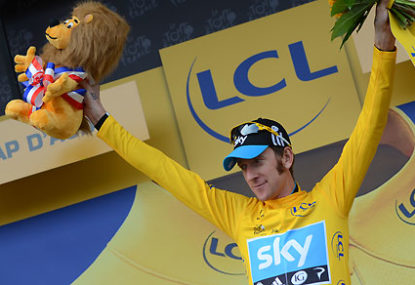'I've just won a stage of the Tour de France, mate!': Hindley grabs yellow jersey as Aussie blows Tour apart
Australia's Jai Hindley has said he is "lost for words" after a shock stage victory at the Tour de France earned him the leader's…

In 2012 the United Kingdom’s search for a Tour de France champion finally came to an end when Bradley Wiggins rode up the Champs Elysees wearing yellow.
The British public were bombarded with books, documentaries and television shows documenting Wiggins and Sky’s exploits.
These detailed not only on the three weeks in France, but also in the major races Wiggins won building up to it – namely Paris-Nice, the Tour de Romandie and the Criterium du Dauphine.
A documentary entitled A Year In Yellow showed Wiggins’ efforts in the lead-up races and was filled out with interviews and sections filmed at Wiggins’ home. The fact that there scenes were filmed months before the Tour de France shows the confidence Sky and the media had in Wiggins’ abilities to go the distance, and perhaps the reason Sky cycling boss Dave Brailsford bought Wiggins in the first place.
When Brailsford stated his aim to win the Tour de France with a clean British rider within five years, there was really only one man who could come close. Brailsford was shrewd enough to know also that a win for Wiggins would be more than just a win for Britain.
If anything was going to get BSkyB to renew their sponsorship of his new road team beyond the initial 2013 expiration date, it would be a win for Wiggins, already a household name in Britain thanks to his Olympic track exploits.
Wiggins was a man that could be marketed as a leader. His outward, some would say arrogant, personality struck a chord with the British public. He was, and still is, a very popular man, and no doubt Brailsford saw the potential for a significant increase in cycling’s popularity should Wiggins win the Tour.
Compare Wiggins with his compatriot and fellow Sky recruit at the start of 2010, Chris Froome, and the differences are immediately apparent. Froome was quiet, reserved and, crucially, virtually unknown to the British sporting public before the 2011 Vuelta a Espana, where he beat Wiggins to finish second.
In Froome’s view, which has been outlined in his recent autobiography The Climb, this gave him leverage in his ongoing contract negotiations with Sky and Brailsford. That he would go to the Tour de France in 2012 as a protected rider. This was not to be for the Kenyan-born Briton however, and when he decided to try and assert his authority on Stage 11 he was promptly called back by Sky’s sport director Sean Yates, a close confidant of Wiggins.
Froome’s attack wasn’t in Brailsford’s script. Documentaries have shown us telling footage of Brailsford and Yates looking incredibly tense on the final climb of Stage 17, as Froome and Wiggins ascended together.
The reason for the tension, according to Sky and Brailsford, was that they wanted to ensure Sky won the Tour de France. However, Froome going ahead to try and catch the lone escapee Alejandro Valverde would not have put Sky’s yellow jersey in danger – third placed Vincenzo Nibali had been distanced – it would have put Wiggins’ yellow jersey in danger, and that is what Sky were concerned with.
Brailsford’s aim was to win the Tour de France with a British rider within five years. In reality, he should have said his true aim, the aim that would bring in not only the most sponsorship, but also the biggest public reaction, which was key to Brailsford and Sky’s promotion of cycling in general.
The true aim was to win the Tour de France with Bradley Wiggins.